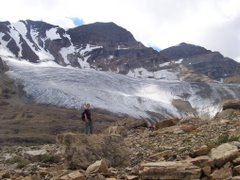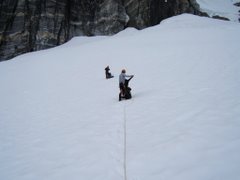 |
| Connecting with a rock. |
Goodbye to the Taylor Valley! I'm back in Ohio. This time, returning from the field feels shocking. The U.S. just shut its doors to immigrants from 7 countries and plans to ramp up fossil fuel extraction. Our entrenchment in carbon-burning grows and yet, last year was the first year that green energy jobs surpassed fossil fuels. Some of the worse impacts of climate change have already been felt in places like Syria. But climate change impacts life in Ohio too. My children can't swim in our local reservoir during the late summer when microcystin takes hold in increasingly warm waters. Clean water is central to our economy (recreation, fisheries), but we're fighting a losing battle if we let surface waters continue to warm.
 |
| Students exploring wetland and stream conditions & chemistry |
This semester, I'm completely revamping my courses to include evidence-based political advocacy. My global climate change classes will examine climate data and consensus reports and come to their own conclusions on the realities of climate change. An emphasis on problem-solving is key to those planning our climate resilience. So my students will consult with local partners who plan for the consequences of climate change in their work. This includes watershed managers, city stormwater managers, and businesses who seek solutions that are profitable and improve our health. After working with experts student teams will advocate for relevant policies based on the evidence they have examined and partner and personal interests. Along the way, I am already rethinking how I teach students about information sources. It is not enough to have my students explore peer-reviewed literature. They need information on how to evaluate the sources they are actually reading. This teaching module on logical fallacies helps. It is pretty easy to get caught in a loop either on the far-right or far-left where our own ideas are confirmed.
Some key things to reinforce in class: 1) evaluate information critically 2) diversity and openness matter now more than ever. It is time to vocally counteract an image of evil brown people and instead think about removing barriers for people who have the greatest biases against them.
More than ever we need to work across disciplines to combat alternative facts and solve the challenges facing humanity.


